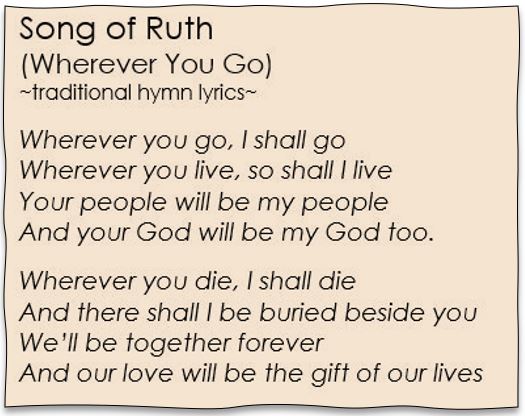Desert Notes

10-27-2022
Some theology–Ruth and Naomi
Recently, Mary Rothschild and I had a conversation about the theology of the story of Ruth and Naomi, which is echoed in the song we’ve sung a few times “Where you go, I will go.” As a former Women’s Studies professor, Mary has a strong reaction to this song because it is a reminder that in the story, patriarchal traditions made it impossible for women to have any autonomy. Women followed husbands and sons wherever they went (changing cultural and religious traditions, even), relying on them for economic and personal safety (and were subject to the potential violence of these men.) When husbands and sons died and left women with no male protection, widows were often without any means to house, feed, and protect themselves. This reality was brutal, and is still a reality for women all over our planet to varying degrees. While women in our country are fighting for reproductive rights, equal pay, and other legal measures to insure our economic and physical well being, women in other countries – especially very patriarchal societies like Afghanistan (and North East African and Middle Eastern countries) – are subjected to very similar restrictions that Ruth and Naomi faced thousands of years ago. For her, this song is a painful reminder of these realities.
For me, the story and the song are also the story of oppressed people working to save one another and subvert power – it is about how we survive together. Ruth goes with Naomi and re-crosses a border; they share the burdens and the opportunities of their changing situations, re-creating family together and assuring each other’s future. (Ruth is an ancestor of King David, supposedly.) Here is a link to a short blog on this, which also looks at the range of ways we might see this story. The song, which has been changed to add the words “refugee” and “ancestor” and “friend.” (I’ve also heard immigrant and some others added) also can be experienced as an anthem about solidarity (“our struggles align.”)
One last thought: our social location also often determines how we hear lyrics. In thinking about audience members who might have identified as American Indian or indigenous, or even folks whose ancestors were enslaved, the line “your people are my people” without the context of the story of Ruth and Naomi might just feel wrong altogether – no solidarity whatsoever. As white bodied people singing this, it’s not necessarily clear where the lines of solidarity and power fall. Even though I feel it in it’s bones that this is meant to be a song for choosing to walk with each other through desperate circumstances it may land very differently for someone in a different social location than mine–or someone who remembers the very patriarchal orientation of this story (and song, with earlier lyrics) as an example of Ruth’s “obedience.” Many Christian communities still teach women they are subject to the will of the men in their lives and experience physical and spiritual harm and abuse as a result.
As Unitarian Universalists, we invite the questions and the discussion that comes with these complexities. It might change how we engage the stories or simply add textures to what we understand when we engage them. It’s important to me, as your minister, that we make space to see the different ways things land for different people based on their experiences, social location, and knowledge. This is also the beginning of understanding that our intent and our impact are not always aligned because other people show up with different stories, needs, and contexts. This is what it means to be pluralistic and to honor diversity! The bottom line for me is that we must align with one another against power that corrupts, subverts human dignity, and prevents any of us from pursuing “life, liberty and the pursuit of happiness.” Human rights are women’s rights, are immigrants rights, are LGBTQ rights– and cannot be subverted based on race or nationality or culture, economic status or disability.
In gratitude, Rev. Sarah Oglesby-Dunegan.
